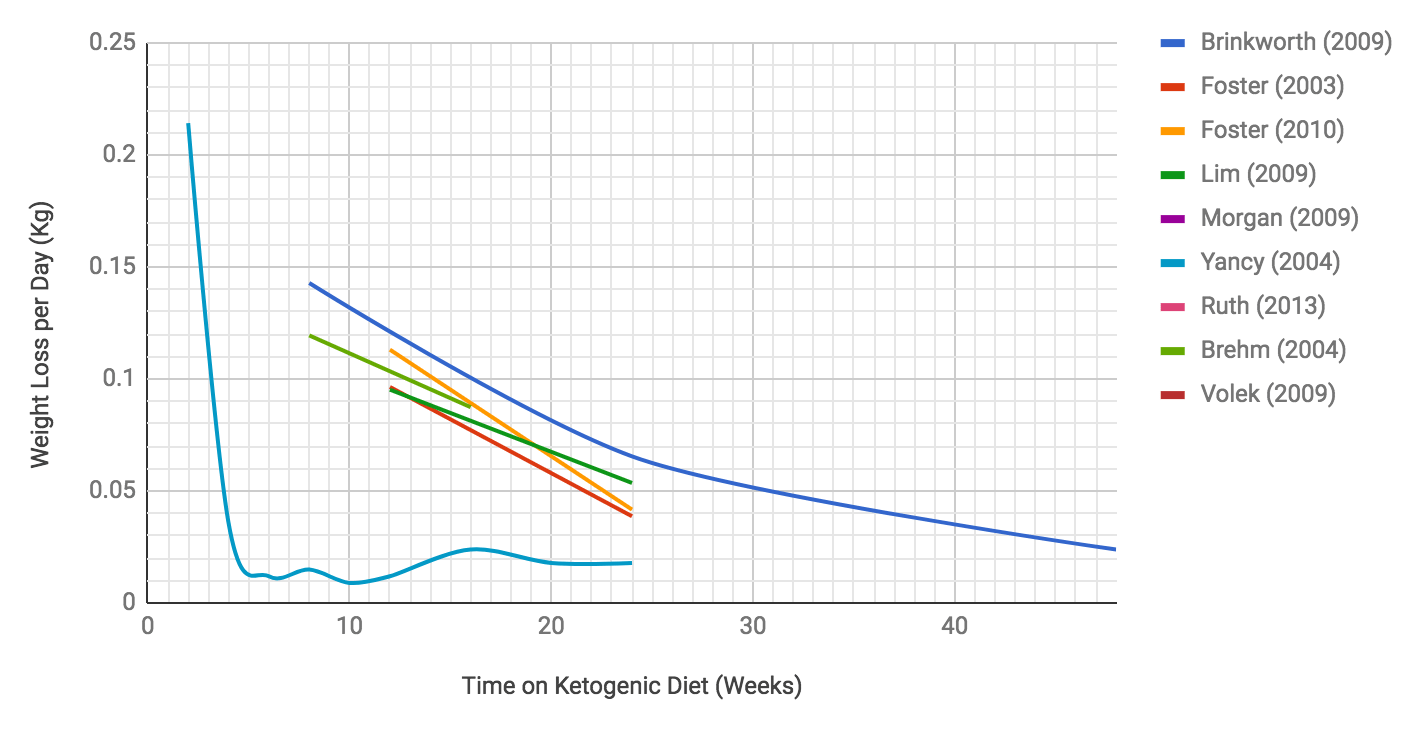How Much Weight Loss on a Ketogenic Diet?

The above chart was based on the collection of studies referenced below which show weight loss on the ketogenic diet. The studies have been analysed for adherence on the Ketogenic diet which we conclude has been followed for at least part of the duration of each of them.
List of Research Study References
Brehm, Bonnie J., et al. “The Role of Energy Expenditure in the Differential Weight Loss in Obese Women on Low-Fat and Low-Carbohydrate Diets.” Journal of Clinical Endocrinology and Metabolism, vol. 90, no. 3, 2005, pp. 1475–82, doi:10.1210/jc.2004-1540. https://academic.oup.com/jcem/article/90/3/1475/2836768
Brinkworth, Grant D., et al. “Long-Term Effects of a Very-Low-Carbohydrate Weight Loss Diet Compared with an Isocaloric Low-Fat Diet after 12 Mo.” American Journal of Clinical Nutrition, vol. 90, no. 1, 2009, pp. 23–32, doi:10.3945/ajcn.2008.27326. https://academic.oup.com/ajcn/article/90/1/23/4596906
Foster, Gary D., et al. “Weight and metabolic outcomes after 2 years on a low-carbohydrate versus low-fat diet: a randomized trial.” Annals of internal medicine 153.3 (2010): 147-157. https://www.ncbi.nlm.nih.gov/pmc/articles/PMC2949959/?_escaped_fragment_=po=25.7813
Foster, G. D., et al. “A Randomized Trial of a Low-Carbohydrate Diet for Obesity.” The New England Journal of Medicine, vol. 348, 2003, pp. 2082–90, http://dx.doi.org/10.1056/NEJMoa022207. http://www.nejm.org/doi/full/10.1056/NEJMoa022207
Lim, S. S., et al. “Long-Term Effects of a Low Carbohydrate, Low Fat or High Unsaturated Fat Diet Compared to a No-Intervention Control.” Nutrition, Metabolism and Cardiovascular Diseases, vol. 20, no. 8, Elsevier Ltd, 2010, pp. 599–607, doi:10.1016/j.numecd.2009.05.003.http://www.nmcd-journal.com/article/S0939-4753(09)00124-0/abstract
Morgan, L. M., et al. “Comparison of the Effects of Four Commercially Available Weight-Loss Programmes on Lipid-Based Cardiovascular Risk Factors.” Public Health Nutrition, vol. 12, no. 6, 2009, pp. 799–807, doi:10.1017/S1368980008003236. https://www.cambridge.org/core/journals/public-health-nutrition/article/comparison-of-the-effects-of-four-commercially-available-weightloss-programmes-on-lipidbased-cardiovascular-risk-factors/CAF926870C6CFE52A2B8220FA9678717
Ruth, Megan R., et al. “Consuming a Hypocaloric High Fat Low Carbohydrate Diet for 12 Weeks Lowers C-Reactive Protein, and Raises Serum Adiponectin and High Density Lipoprotein-Cholesterol in Obese Subjects.” Metabolism: Clinical and Experimental, vol. 62, no. 12, Elsevier Inc., 2013, pp. 1779–87, doi:10.1016/j.metabol.2013.07.006.http://www.metabolismjournal.com/article/S0026-0495(13)00223-0/abstract
Volek, Jeff S., et al. “Carbohydrate Restriction Has a More Favorable Impact on the Metabolic Syndrome than a Low Fat Diet.” Lipids, vol. 44, no. 4, 2009, pp. 297–309, doi:10.1007/s11745-008-3274-2. https://link.springer.com/article/10.1007/s11745-008-3274-2
William S. Yancy Jr., MD, MHS; Maren K. Olsen, PhD; John R. Guyton, MD; Ronna P. Bakst, RD; and Eric C. Westman, MD, MHS, and Background: “A Low-Carbohydrate , Ketogenic Diet versus a Low-Fat Diet To Treat Obesity and Hyperlipidemia.” Annals of Internal Medicine, vol. 140, 2004, pp. 769–79, doi:10.1038/nm0603-677. https://annals.org/aim/fullarticle/717451/low-carbohydrate-ketogenic-diet-versus-low-fat-diet-treat-obesity